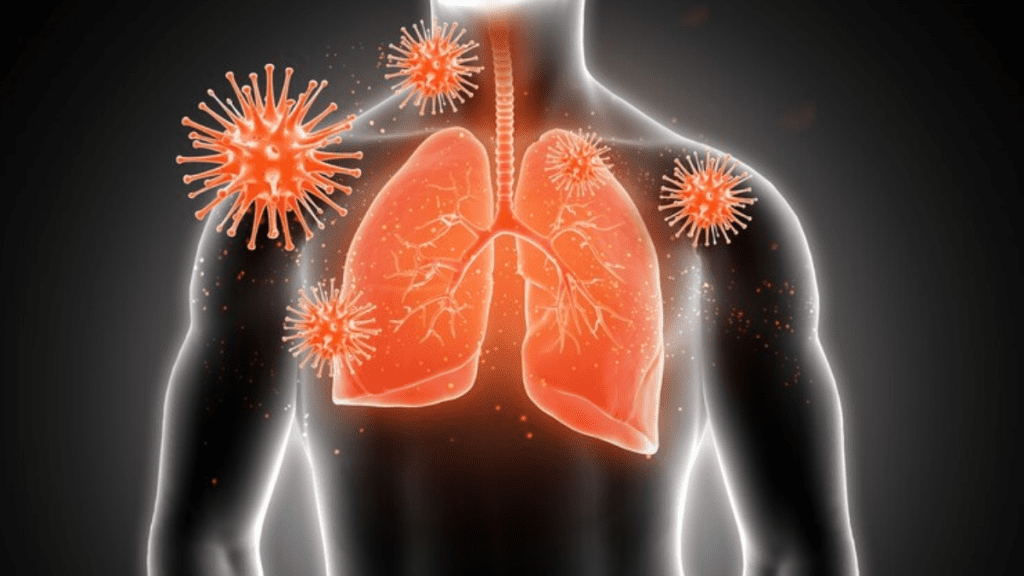Lung cancer remains one of the leading causes of cancer-related deaths worldwide. Despite advancements in medical treatments, the key to improving survival rates lies in early detection. Recognizing the early symptoms of lung cancer can significantly improve the chances of successful treatment. Unfortunately, many people overlook these warning signs, delaying diagnosis and reducing their chances of recovery. In this article, we will explore the most common early symptoms of lung cancer, helping you understand when it’s time to seek medical advice.
1. Persistent Cough: A Warning That Shouldn’t Be Ignored

One of the earliest and most common symptoms of lung cancer is a persistent cough that doesn’t go away. If you’ve been coughing consistently for more than a few weeks, and the condition worsens over time, it could be an early indication of lung cancer.
While a persistent cough can be associated with several other conditions, such as a cold or flu, it’s essential not to dismiss it. The cough may also be accompanied by blood or unusual sputum, both of which are red flags that require immediate medical attention. If you’ve noticed these changes, especially if you’re a smoker, seek medical evaluation right away.
2. Changes in a Chronic Cough: Know the Difference
For people who already have a chronic cough due to smoking or a condition like bronchitis, any changes in the nature of the cough should not be ignored. Has your cough become more frequent? Does it produce more mucus than before? Or do you experience discomfort or pain when coughing? These changes could signal an underlying issue, potentially lung cancer.
A change in the type, sound, or severity of your chronic cough may indicate that something is affecting your lungs beyond their usual condition. It’s important to pay attention to these alterations and take action early by consulting a healthcare professional.
3. Shortness of Breath: When Breathing Becomes a Struggle
Shortness of breath, particularly during everyday activities that previously caused no discomfort, is another potential early symptom of lung cancer. As the tumor grows, it can block the airways or cause fluid to accumulate in the lungs, making it harder to breathe.
People with lung cancer often notice that they can’t catch their breath during routine tasks like walking up the stairs or even talking. This symptom can sneak up on you gradually, so if you find yourself frequently out of breath, it’s time to consult a doctor.
4. Chest Pain: A Discomfort That Shouldn’t Be Overlooked

Chest pain, especially if it’s persistent and not related to physical injury, is another common warning sign of lung cancer. The pain may not always feel sharp; it can present as a dull, aching sensation. It can also extend to other areas such as the shoulder or back.
This pain may result from the tumor pressing on nerves or other structures within the chest. If you experience any unexplained or prolonged chest pain, do not brush it off—seek a professional medical evaluation.
5. Hoarseness: Your Voice Can Speak Volumes
Hoarseness, or a change in your voice, can occur for many reasons, like a cold or vocal strain. However, if the hoarseness persists for more than two weeks, it may be a sign of something more serious, such as lung cancer.
A tumor in the lung may press on the nerve that controls the vocal cords, causing voice changes. If you notice that your voice is constantly raspy or you’re losing your voice without an obvious reason, it’s time to consult your doctor for a check-up.
6. Unexplained Weight Loss and Loss of Appetite: A Subtle but Serious Symptom

Unexplained weight loss is often one of the first signs of many cancers, including lung cancer. If you find yourself losing weight without trying and this is accompanied by a loss of appetite, it’s crucial to take these symptoms seriously.
Weight loss occurs because cancer uses up a lot of the body’s energy, and tumors can alter the way your body processes food and nutrients. If you’ve experienced sudden weight loss without making any dietary changes or increasing physical activity, it’s important to speak with your doctor.
7. Fatigue: When Exhaustion Overcomes You
Everyone feels tired from time to time, but fatigue related to lung cancer is different. This is an extreme tiredness that doesn’t go away, even after rest. It can feel like a bone-deep exhaustion that leaves you unable to complete daily tasks.
Cancer cells compete with healthy cells for energy, and your body uses significant resources to try and fight the disease. If you find yourself feeling constantly tired, even when you’re getting enough sleep and rest, don’t dismiss it as just “being busy.” Consider it as a potential sign of an underlying issue and get it checked out.
8. Finger Clubbing and Pain: A Surprising Symptom

While it’s not the most well-known symptom, finger clubbing can be an early sign of lung cancer. This occurs when the fingertips become thicker or more rounded than usual, and the nails may appear shiny or curved. Pain in the fingertips may also accompany this condition.
Finger clubbing happens because lung tumors can release chemicals into the bloodstream that affect tissue growth. If you notice any changes in the shape or thickness of your fingers, it’s worth bringing up to your doctor during your next visit.
Why Early Detection Matters
Recognizing these early symptoms can make a world of difference in the outcome of lung cancer. Catching the disease in its initial stages allows for more treatment options and a higher chance of survival. Lung cancer can be aggressive, but early detection is the key to slowing its progress and increasing the likelihood of successful treatment.

Lung cancer screening, especially for high-risk individuals such as smokers, can also play a critical role in early detection. If you’re concerned about any symptoms or have a history of smoking, consider speaking to your doctor about getting screened.
Conclusion: Don’t Ignore the Signs
Lung cancer is a serious and potentially life-threatening disease, but early detection offers hope. By being aware of the early warning signs like a persistent cough, changes in a chronic cough, shortness of breath, chest pain, hoarseness, unexplained weight loss, fatigue, and finger clubbing, you can take control of your health and seek medical attention when necessary. If you notice any of these symptoms, don’t hesitate—consult your healthcare provider immediately. Early detection could save your life.


